We often think sleep issues are the purview of newborns. In truth, they represent a problem for many teens, whose late nights and early mornings leave them fatigued and sometimes in danger. For example, new driving research from SADD and Liberty Mutual Insurance reveals that teens report getting an average of only 7.2 hours of sleep on school nights — far less than the 8.5 to 9.5 hours of sleep recommended for them by the National Sleep Foundation.
Why is this dangerous? Insufficient sleep can be linked to a host of physiological and psychological problems. It is also a significant factor in automobile crashes. In fact, drowsy driving causes more than 10,000 crashes each year, leading to 40,000 injuries and more than 1,500 deaths, according to the National Highway Traffic Safety Administration. The SADD/LMI data points out that teens who get less than eight hours of sleep per night on average are twice as likely to say they have fallen asleep at the wheel than are teens who report getting an average of at least eight hours of sleep per night.
Stephen’s new column, Cheating Sleep, discusses this issue in greater detail.
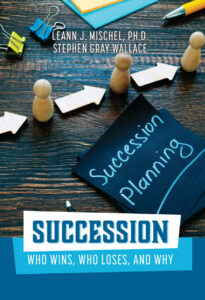 Succession offers “user’s guide” to small and family owned businesses through the stages of planning, employment. and ownership policies, shareholder meetings, family health emergencies, business planning, and alignment/engagement of employees. Covering both the positives and potential pitfalls inherent in the planning and implementation process, Succession represents a realistic roadmap to one of the more difficult periods of business ownership.
Succession offers “user’s guide” to small and family owned businesses through the stages of planning, employment. and ownership policies, shareholder meetings, family health emergencies, business planning, and alignment/engagement of employees. Covering both the positives and potential pitfalls inherent in the planning and implementation process, Succession represents a realistic roadmap to one of the more difficult periods of business ownership.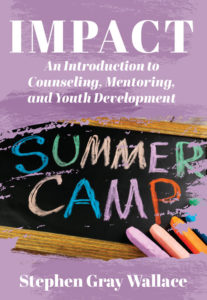 Stephen’s new book, IMPACT – An Introduction to Counseling, Mentoring, and Youth Development, offers insightful commentary on the important role of mentors in the lives of children and teens. While it specifically addresses camp counselors, it is equally relevant for all key youth influencers, including parents, teachers, and coaches. …
Stephen’s new book, IMPACT – An Introduction to Counseling, Mentoring, and Youth Development, offers insightful commentary on the important role of mentors in the lives of children and teens. While it specifically addresses camp counselors, it is equally relevant for all key youth influencers, including parents, teachers, and coaches. … This is an important time in teenagers’ lives — when they will develop driving habits that can be good and bad. Parents need to take an active role in helping teens develop safe driving behaviors because teenagers are involved in more car accidents than any other age group. …
This is an important time in teenagers’ lives — when they will develop driving habits that can be good and bad. Parents need to take an active role in helping teens develop safe driving behaviors because teenagers are involved in more car accidents than any other age group. …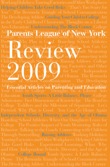 The Parents League Review is an annual literary journal with articles on parenting and education.
The Parents League Review is an annual literary journal with articles on parenting and education.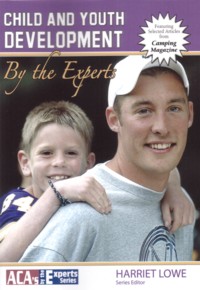 Child and Youth Development features eighteen articles that have been carefully selected from past editions of Camping Magazine, including Rites of Passage: Camp Pays Off in Youth Development, Happiness, Health, and Safety,” written by SADD Chairman and CEO Stephen Wallace. The contributing writers are recognized as authoritative voices in the field of child and youth development. Produced in cooperation with the American Camp Association. …
Child and Youth Development features eighteen articles that have been carefully selected from past editions of Camping Magazine, including Rites of Passage: Camp Pays Off in Youth Development, Happiness, Health, and Safety,” written by SADD Chairman and CEO Stephen Wallace. The contributing writers are recognized as authoritative voices in the field of child and youth development. Produced in cooperation with the American Camp Association. … This new book gives high school students the inside scoop on figuring out who they are and where they want to go by offering teens the kind of comprehensive, down-to-earth advice they need and want. …
This new book gives high school students the inside scoop on figuring out who they are and where they want to go by offering teens the kind of comprehensive, down-to-earth advice they need and want. … LOVE THAT BOY is a uniquely personal story about the causes and costs of outsized parental expectations. What we want for our children—popularity, normalcy, achievement, genius—and what they truly need—grit, empathy, character—are explored by National Journal’s Ron Fournier, who weaves his extraordinary journey to acceptance around the latest research on childhood development and stories of other loving-but-struggling parents.
LOVE THAT BOY is a uniquely personal story about the causes and costs of outsized parental expectations. What we want for our children—popularity, normalcy, achievement, genius—and what they truly need—grit, empathy, character—are explored by National Journal’s Ron Fournier, who weaves his extraordinary journey to acceptance around the latest research on childhood development and stories of other loving-but-struggling parents. 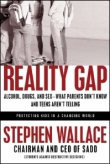 Reality Gap paints an alarming portrait of a modern-day adolescence filled with potentially deadly behaviors carefully hidden from the view of parents and other adults. But it is also a book about hope and inspiration, pointing to the incredibly powerful role that parents and other mentors can play in the lives of young people and highlighting the tremendous contributions that many teens are making to their families, schools, and communities. …
Reality Gap paints an alarming portrait of a modern-day adolescence filled with potentially deadly behaviors carefully hidden from the view of parents and other adults. But it is also a book about hope and inspiration, pointing to the incredibly powerful role that parents and other mentors can play in the lives of young people and highlighting the tremendous contributions that many teens are making to their families, schools, and communities. …